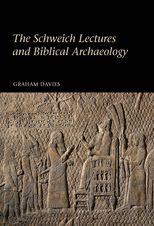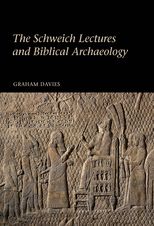The Schweich Lectures and Biblical Archaeology
The Schweich Lectures and Biblical Archaeology
Cite
Abstract
The first Schweich Lectures were given by Professor S. R. Driver of Oxford University in 1908 and the British Academy celebrated the centenary of the lectures with a single lecture in 2008. This book is an amplified version of that lecture, with each of its three chapters developing a theme relevant to the occasion. The lectures, on aspects of the study of antiquity in its relationship to the Bible, were established by a gift from Constance Schweich (later Mrs Goetze) in memory of her late father, Leopold Schweich. The first chapter of this book brings together biographical information (including some previously unpublished documents) about the Schweichs, who were originally a German Jewish family with close connections to the distinguished chemist and industrialist Ludwig Mond. The donation was the first major benefaction received by the British Academy, which had been founded in 1901 but initially had no government funding. The second chapter uses archival and published sources to reconstruct the circumstances and the history of the lectureship. An Appendix lists the names of all the lecturers, their subjects, and details of the publication of their lectures. The final chapter, ‘Archaeology and the Bible — A Broken Link?’, examines broader questions about ‘biblical archaeology’, which arose in the later twentieth century in the light of developments in archaeological theory and biblical scholarship, and considers whether there is still a future for collaboration between the two disciplines. The book provides a glimpse into Jewish philanthropy in England in the Edwardian era.
Sign in
Personal account
- Sign in with email/username & password
- Get email alerts
- Save searches
- Purchase content
- Activate your purchase/trial code
Institutional access
-
Sign in through your institution
- Sign in with a library card Sign in with username/password Recommend to your librarian
Institutional account management
Sign in as administratorPurchase
Our books are available by subscription or purchase to libraries and institutions.
Purchasing information| Month: | Total Views: |
|---|---|
| July 2023 | 2 |
| July 2023 | 3 |
| July 2023 | 3 |
| July 2023 | 3 |
| July 2023 | 3 |
| July 2023 | 3 |
| July 2023 | 3 |
| July 2023 | 3 |
| November 2023 | 2 |
| November 2023 | 2 |
| November 2023 | 2 |
| November 2023 | 2 |




Get help with access
Institutional access
Access to content on Oxford Academic is often provided through institutional subscriptions and purchases. If you are a member of an institution with an active account, you may be able to access content in one of the following ways:
IP based access
Typically, access is provided across an institutional network to a range of IP addresses. This authentication occurs automatically, and it is not possible to sign out of an IP authenticated account.
Sign in through your institution
Choose this option to get remote access when outside your institution. Shibboleth/Open Athens technology is used to provide single sign-on between your institution’s website and Oxford Academic.
If your institution is not listed or you cannot sign in to your institution’s website, please contact your librarian or administrator.
Sign in with a library card
Enter your library card number to sign in. If you cannot sign in, please contact your librarian.
Society Members
Society member access to a journal is achieved in one of the following ways:
Sign in through society site
Many societies offer single sign-on between the society website and Oxford Academic. If you see ‘Sign in through society site’ in the sign in pane within a journal:
If you do not have a society account or have forgotten your username or password, please contact your society.
Sign in using a personal account
Some societies use Oxford Academic personal accounts to provide access to their members. See below.
Personal account
A personal account can be used to get email alerts, save searches, purchase content, and activate subscriptions.
Some societies use Oxford Academic personal accounts to provide access to their members.
Viewing your signed in accounts
Click the account icon in the top right to:
Signed in but can't access content
Oxford Academic is home to a wide variety of products. The institutional subscription may not cover the content that you are trying to access. If you believe you should have access to that content, please contact your librarian.
Institutional account management
For librarians and administrators, your personal account also provides access to institutional account management. Here you will find options to view and activate subscriptions, manage institutional settings and access options, access usage statistics, and more.